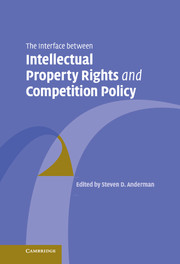Book contents
- Frontmatter
- Contents
- Notes on contributors
- Preface
- 1 The competition law/IP ‘interface’: an introductory note
- PART I Intellectual property rights and competition law in the major trading blocks
- PART II Intellectual property rights and competition law in smaller and medium sized open economies
- PART III Issues related to the interface between intellectual property rights and competition law
- 8 Parallel imports
- 9 Technology transfer
- 10 The relationship between intellectual property law and competition law: an economic approach
- Index
9 - Technology transfer
Published online by Cambridge University Press: 27 July 2009
- Frontmatter
- Contents
- Notes on contributors
- Preface
- 1 The competition law/IP ‘interface’: an introductory note
- PART I Intellectual property rights and competition law in the major trading blocks
- PART II Intellectual property rights and competition law in smaller and medium sized open economies
- PART III Issues related to the interface between intellectual property rights and competition law
- 8 Parallel imports
- 9 Technology transfer
- 10 The relationship between intellectual property law and competition law: an economic approach
- Index
Summary
Introduction
The institution that most changes our lives we least understand, or more correctly, seek most elaborately to misunderstand. That is the modern corporation.
John Kenneth Galbraith, The Age of Uncertainty (1977)There is no doubt that since World War II, licences and other forms of technology transfer agreements have fulfilled technological needs that could not be met by local technical and scientific capabilities. Currently, the Asia–Pacific region, including Singapore, is one of the most important acquirers of foreign technologies through contractual channels in the developed world. The aim of this chapter is to look at the competition implications faced by producers in developing and newly developed economies in licensing-in technology or through some form of foreign direct investment (FDI) from the developed world or other parts of the global economy with the aim of stimulating domestic production or with the aim of using as inputs into local manufacturing process, and creating new outputs for export. FDI is moving into services, but its relationship with technology transfer, particularly in developing countries, has always been complex. As a recent United Nations Conference on Trade and Development (UNCTAD) report stressed: ‘As commercial enterprises, transnational companies (TNCs) in principle do not have an interest in transferring knowledge to and supporting innovation in foreign affiliates beyond what is needed for the production process or product in question. Developing countries therefore cannot expect that, by simply opening their doors to FDI, TNCs will transform their technological base.’
- Type
- Chapter
- Information
- Publisher: Cambridge University PressPrint publication year: 2007
- 2
- Cited by



